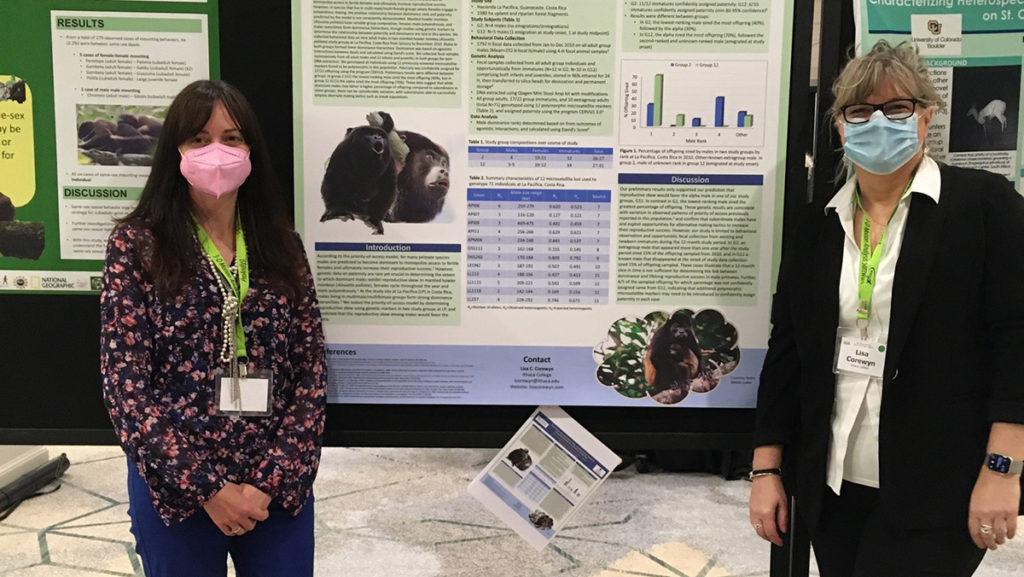Kari Brossard Stoos, associate professor and associate chair in the Department of Health Promotion and Physical Education at Ithaca College, presented her research on the causes behind declining populations of mantled howler monkeys at the Universidad Nacional de Costa Rica in March for the first time.
Lisa Corewyn, assistant professor in the Department of Anthropology, and Brossard Stoos have been conducting this research along with other professors and students. The professors’ research suggests populations of mantled howler monkeys are declining in Costa Rica. The species’ declining health — which comes as a result of climate change, a shortage of resources and chemical exposure — might have greater environmental implications. Brossard Stoos said the presence of human antimicrobials could have serious impacts on the environments of the now–endangered mantled howler monkeys.
“Humans broach on that interface and leave things in the habitat of the animals, and those things could be antimicrobials,” Brossard Stoos said. “They could be toxins [or] pesticides, and that affects the microbes in the environment. So, the microbes that are in the environment also depict what’s going to happen in the health of the animals.”
The effects of antimicrobials on the health of mantled howler monkeys spreads beyond that species alone. There are greater implications for the environment.
“Antimicrobial resistance is one of the fastest growing public health threats that we have right now,” Brossard Stoos said. “It’s still a big piece of why I continue my research. … It not only threatens us and our health, but it threatens wildlife.”
Although Brossard Stoos’ collaborative research now focuses on mantled howler monkeys, her expertise did not originally involve the species. Brossard Stoos’ primary interest is in microbes, particularly in how they came into contact with humans and how they continue to survive manmade disinfectants. Similar to a virus, microbes can build up a resistance to disinfectant chemicals or processes. After Brossard Stoos met Corewyn, the two began their research on the mantled howler monkeys.
Corewyn has been collecting stool samples from a population of howler monkeys in Costa Rica since 2009. When she came to Ithaca College in 2014, she found herself looking for lab space to continue her research, and so was Brossard Stoos. The two ended up sharing the same area, and although their research was quite different, they soon discovered an overlap. The mantled howler monkeys were dependent on the microbes that permeated their environment, and changes to that environment had drastic effects on their health. Brossard Stoos and Corewyn then cultivated their current work.
“We’ve joined forces and we’re collaborating on a pretty big project now about health and aspects that might be contributing to the decline of [the mantled howler monkey] population,” Corewyn said. “So now not only are we partners in the laboratory, we are also partners in the field and in our research.”
Brossard Stoos presented her research on the causes behind the declining populations of mantled howler monkeys at the Universidad Nacional de Costa Rica. During her presentations, she gave talks primarily centered around the encroachment by humans on the habitats of vulnerable species.
“It’s always energizing to give presentations to a different audience and there was a lot of really stimulating conversation that came out after that,” Brossard Stoos said. “It was really exciting to hear all of these scholars and students in the room coming up with these additional questions and additional things to be thinking about.”
Brossard Stoos and Corewyn’s research experienced delays because of the COVID-19 pandemic. The two collected samples from the mantled howler monkey population in 2019, but have been unable to process the samples, which are currently in Costa Rica, because of pandemic travel restrictions. Yet the sample collection process gave a great learning opportunity to the student volunteers who joined Brossard Stoos and Corewyn. About 20 students joined the researchers.
“Oftentimes, the students come back and continue to work in the lab while they’re still here,” Corewyn said. “They make really strong connections between what we do in the field and what we do in the laboratory, and that’s a really rare and unique opportunity for students to have.”
Senior Madison Jones, a health science major, helped Brossard Stoos isolate DNA, run polymerase chain reactions and complete other tasks to contribute to the mantled howler monkey research during the 2020–21 academic year.
“I had [Brossard Stoos] as a professor … and I emailed her to ask what kind of research happened in health sciences,” Jones said. “She invited me to do research with her, which was really great.”
After Jones’ work with Brossard Stoos, she presented the research at the 2021 Whalen Symposium and won an award. More so than her success at the symposium, Jones said she was thankful for the experience that the research gave her.
“Because of [COVID-19], I hadn’t been able to take a lot of in-person labs that traditionally I would have taken,” Jones said. “I didn’t get that in-person knowledge and skills, and I was really able to build that through doing the research.”
Brossard Stoos and Corewyn plan to go back to Costa Rica in summer 2023 to continue their research. They are applying for a grant from the National Science Foundation, an agency of the United States government that funds independent research. In addition to analyzing their current samples, the two hope to do another census of the mantled howler monkey population and determine whether or not there have been any significant changes from their 2017 census. Brossard Stoos said she and Corewyn are thankful for the help they’ve received.
“We’re very grateful for the support that we’ve had,” Brossard Stoos said. “Without those initial pieces of support, we could not build the research … we are at right now.”








